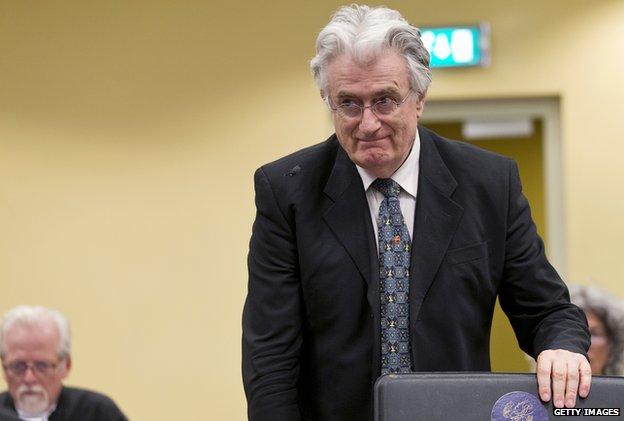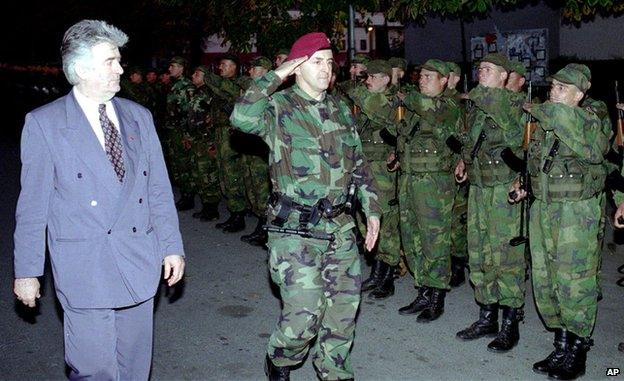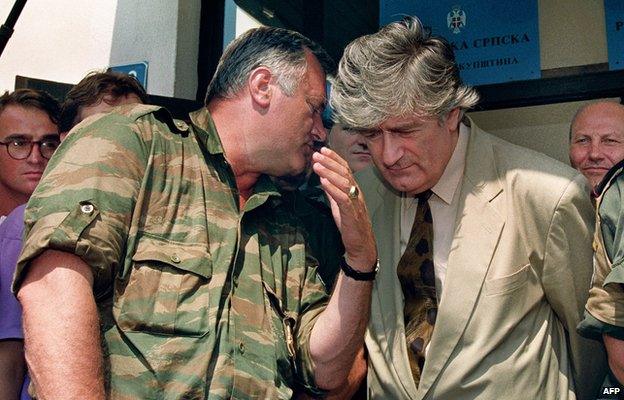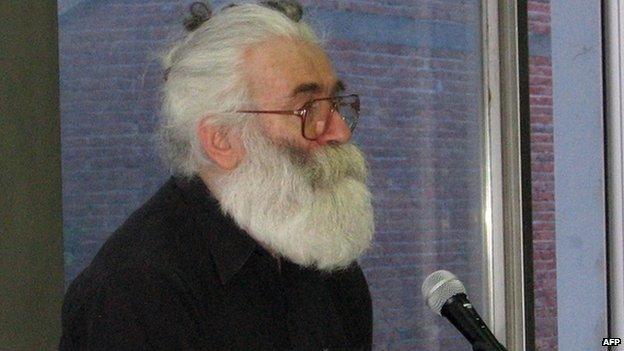Radovan Karadzic: Former Bosnian Serb leader
- Published

Radovan Karadzic was handed over to the UN tribunal after 13 years on the run
Radovan Karadzic, the former Bosnian Serb leader, was found guilty of genocide and crimes against humanity during the 1992-95 Bosnian war.
The atrocities during the war have been described as the worst crimes committed in Europe since World War Two.
At a UN tribunal in The Hague, judges found him guilty of 10 out of 11 counts of genocide, war crimes, crimes against humanity and other atrocities in the Bosnian war of the 1990s, including leading the slaughter of thousands of Bosnian Muslims (Bosniaks) and Croats.
One count of genocide related to the massacre of more than 7,500 Muslim men and boys in the Srebrenica enclave in July 1995, which the UN said was part of a campaign to "terrorise and demoralise the Bosnian Muslim and Bosnian Croat population".
He was found not guilty in one count of genocide, relating to the forcible expulsion of hundreds of thousands of non-Serbs from seven towns and villages in Bosnia.
The trial was a weighty affair - lasting five years, followed by an additional 18-month deliberation by the bench. Over 497 days, Mr Karadzic conducted his own defence, referring to some three million pages of evidence against him.
He was sentenced to 40 years in prison - though his lawyer has indicated he will appeal.

Mr Karadzic's political party organised Serbs to fight against Bosniaks and Croats in Bosnia
The former Bosnian Serb leader was also found guilty of orchestrating the shelling of Sarajevo, and the use of 284 UN peacekeepers as human shields in May and June 1995.
As he closed his case, he told the tribunal there was not a shred of evidence against him, although in a written statement he accepted that in his role as political leader of the Bosnian Serbs he bore "moral responsibility" for crimes they had carried out.
Radovan Karadzic spent 13 years on the run before being handed over to the tribunal.
He had been found living in disguise in Belgrade, under a false name and working as a New Age healer. He had even become well-known on the alternative health circuit, reportedly publishing a column in Healthy Living magazine.
A bushy grey beard and thick glasses had transformed his appearance.
Since the court adjourned to deliberate, Serbian prosecutors have arrested and charged eight people with playing direct roles in the Srebrenica massacre.
Poet and psychiatrist
Mr Karadzic was born in 1945 in a stable in Savnik, Montenegro.
His father, Vuk, had been a member of the Chetniks - Serb nationalist guerrillas who fought against both Nazi occupiers and Tito's communist partisans in World War II - and was in jail for much of his son's childhood.

Karadzic Timeline
1945: Born in Montenegro
1960: Moves to Sarajevo
1968: Publishes collection of poetry
1971: Graduates in medicine
1983: Becomes team psychologist for Red Star Belgrade football club
1990: Becomes president of Serbian Democratic Party
1990s Political leader of Bosnian Serbs
2008: Arrested in Serbia
2009: Trial begins at The Hague
2014: Judges begin 18-month deliberation
March 2016: Found guilty of 10 out of 11 counts

His mother, Jovanka Karadzic, described her son as loyal, and a hard worker who used to help her in the home and in the fields. She said he was a serious boy who was respectful towards the elderly and helped his school friends with their homework.
In 1960 Mr Karadzic moved to Sarajevo, where he later met his wife, Ljiljana, graduated as a doctor, and became a psychiatrist in a city hospital.
He also became a poet and fell under the influence of Serb nationalist writer Dobrica Cosic, who encouraged him to go into politics.
After working briefly for the Green Party, he helped set up the Serbian Democratic Party (SDS) - formed in 1990 in response to the rise of nationalist and Croat parties in Bosnia, and dedicated to the goal of a Greater Serbia.
Less than two years later, as Bosnia-Hercegovina gained recognition as an independent state, he declared the creation of the independent Serbian Republic of Bosnia and Hercegovina (renamed Republika Srpska) with its capital in Pale, a suburb of Sarajevo, and himself as head of state.
Mr Karadzic's party, supported by Serbian leader Slobodan Milosevic, organised Serbs to fight against the Bosniaks and Croats in Bosnia.
'Ethnic cleansing'
A vicious war ensued, in which Serbs besieged Sarajevo for 44 months, shelling Bosniak forces but also terrorising the civilian population with a relentless bombardment and sniper fire. Thousands of civilians died, many of them deliberately targeted.

Ratko Mladic was Radovan Karadzic's military chief during the war
Bosnian Serb forces - assisted by paramilitaries from Serbia proper - also expelled hundreds of thousands of Bosniaks and Croats from their homes in a brutal campaign of "ethnic cleansing". Numerous atrocities were documented, including the widespread rape of Bosniak women and girls.
Reporters also discovered Bosnian Serb punishment camps, where prisoners-of-war were starved and tortured.
War crimes were also committed against Serb civilians by the Bosnian Serbs' foes in the bitter inter-ethnic war.
Mr Karadzic was jointly indicted in 1995 along with the Bosnian Serb military leader, Ratko Mladic, for war crimes they had allegedly committed during the 1992-95 war.
He was obliged to step down as president of the SDS in 1996 as the West threatened sanctions against Republika Srpska.
'Immunity promise'
After the Dayton accord that ended the Bosnian war, he eventually went into hiding - possibly in the mountainous south-eastern area of the Serb-controlled part of Bosnia, protected by paramilitaries.
Mr Karadzic says Dayton's chief architect, US diplomat Richard Holbrooke, promised him immunity from prosecution in exchange for quitting the political scene. Mr Holbrooke denies any such deal was struck.

Radovan Karadzic was working as a New Age healer when he was arrested in Belgrade
When he finally appeared before the UN's International Criminal Tribunal for the former Yugoslavia (ICTY) in August 2008, he failed to respond to the charges against him and the court entered pleas of "not guilty" on his behalf.
Prosecutors accused him of using delaying tactics as he boycotted the initial hearings and insisted on representing himself.
Launching his own defence in 2012, he sought to cast himself as a "mild man" who should be "rewarded" for having tried to avoid war.
His performance was described by one publication as "by turns eloquent, historically provocative, and self-aggrandising".